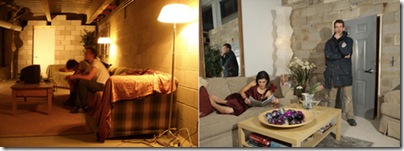We're All Asked to be Performance Artists
Excerpt from "The couple who lived in the mall," Salon.com:
They never intended to undermine the mall or its corporate structure, or to make a spectacle of themselves. [Michael]Townsend describes himself as "wired for happiness" and [Adriana] Yoto's idea of a good time is cataloguing all the items in a store and rating their desirability from "gift-worthy" to "if-it-were-the-apocalypse-and-I-was-looting-I-would-take-it." Which is precisely what they did during their stint living at the mall. Every day.
Each of them voted in one item (a flashlight, space blanket, sketchbook and facecloth) and accepted an allowance of $20. "I had a lot of tea," said Yoto. They camouflaged themselves, carrying empty Nordstrom bags and wearing mall outfits -- nice slacks and button-down shirts. At night they had to skirt through a 2-foot-wide passage to the dark space Townsend had found, its walls and ceiling coated in what Yoto described as "opaque gray oatmeal mixed with the contents of a lint trap." They made a bed of cardboard and insulation tiles where they spent cold nights, not risking capture by using the mall off-hours. They washed up -- it was dusty -- in mall bathrooms, while Yoto arrived at the porcelain sink in the Origins store each morning, sampling its face cleansers. Occasionally, they leafed through books at Borders.
They were, after four days, both completely bored and totally ecstatic. "I felt this vacation-like euphoria that I've never felt till then or since then," Townsend said. "It was better for me than any nature walk I've every taken." Let's be clear: He's not being ironic -- this is wired-for-happiness talking. They felt they had subverted the mall's reason for existence by not buying anything, yet they had achieved what it promised: a release from the burdens of everyday life, within walking distance.

After their experimental week, Yoto and Townsend returned regularly for four years, attempting to transform that storage space into a luxury apartment furnished by the mall. They built a wall with 39-pound cinder blocks that they hauled in themselves -- there was plenty of hard physical labor involved in their attempt at the high life. They added sofas, tables, lamps, a TV, a china hutch and a Sony PlayStation (which was stolen while they lived there, which suggests their presence wasn't entirely secret), and stayed for days at a time. They planned to install pre-laminated wood flooring and a portable toilet.
Yoto says they played house to submit to the "demands to hyper-stylize." She's referring to the visions of decorating perfection in the Pottery Barn catalogs or Domino magazine that make their way to our mailboxes, to the pressure some internalize to make our homes match those images, to have them always ready for inspection. "We're all asked to be performance artists every day," she says. "We're all being watched."
In the mall -- perhaps the most heavily surveilled public arena we have, with security cameras and long lists of behavioral rules -- she lived a parallel existence in which she realized those hyper-stylizing dreams, performed for that invisible audience by placing tiny jars of sand on a decorative shelf and a cloth runner on the dining room table, flourishes she would excoriate in her real life, in her own loft a mile away.
Yet while Yoto and Townsend critiqued the mall as an agent of surveillance, they worked hard to make sure they were surveilled. They scanned their sketchbooks' pages onto their blogs. They uploaded handmade maps of the mall's undefined spaces. They posted video of their mall apartment on their Web site, which began to appear near the top of Google searches for Providence Place. They assume that's how security knew to search for them, finding Townsend one October afternoon behind the door they built. Townsend yelled "Surprise!" when they turned on the lights. He pleaded no contest, was sentenced to six months probation and was banned from the mall.





